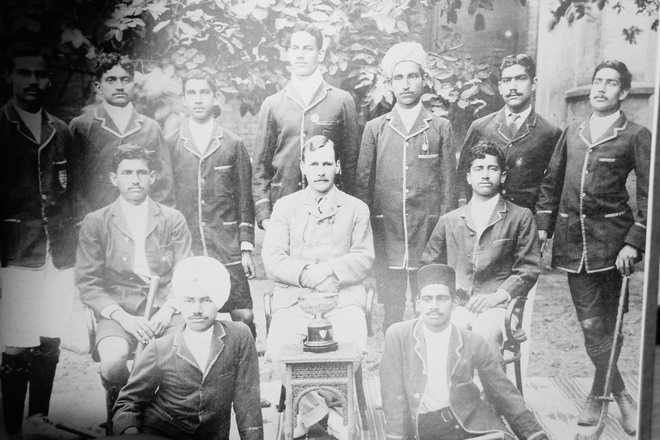Vikramdeep Johal
Tribune News Service
Chandigarh, September 4
What happened on April 13, 1919, in Amritsar is well known. However, the incidents preceding the Jallianwala Bagh massacre have shrunk to a mere footnote in history. An unsung hero from those turbulent times was Gerard Anstruther Wathen, then Principal of Khalsa College. Thanks largely to his initiative, claims a historian, the administration didn’t carry out aerial bombing of the riot-hit holy city on April 11. There could have been an even bigger bloodbath than the one perpetrated by General Reginald Dyer, had the bombs rained down.
Sharing his research findings with The Tribune, London-based historian Dr Kim A Wagner says, “Wathen intervened to let local residents gather for funerals on April 11, before Dyer arrived, and negotiated an arrangement with the authorities — if people failed to disperse by 2 pm, airplanes would drop bombs on the city. The residents did the needful, averting a major tragedy. His intervention was crucial as some British officers, including AJW Kitchin, Commissioner of Lahore, were quite prepared to use force.”
Wathen feared that if any damage was caused particularly to the Golden Temple, the Sikh soldiers would rise together in rebellion against the Empire. His artist wife, Melicent, noted in her diary that he sent his students and a local ‘maulvi’ to warn people about the 2 pm deadline.
Born in Kent (England) in 1878, Wathen entered the elite Indian Education Service in 1905. He served as Professor of English and Economics at Government College, Lahore, and Inspector of Schools, Jalandhar Division, before joining as Principal of Khalsa College, Amritsar, in 1915.
Legend has it that the Principal and his wife carried basketfuls of rubble on their heads during the construction of the college’s main building and cubicles for boarders. He spearheaded the “coats off” movement, which was aimed at teaching students the importance of manual labour. During his tenure, the college produced several outstanding students, including Ram Parsad Singh Grewal (also known as S Pertab), who made it to the Indian Civil Service in 1921 and later served as the Deputy Commissioner of Delhi, Ferozepur, Lahore and Shimla. Another distinguished alumnus was civil engineer Kishan Singh, father of Arjan Singh, Marshal of the Indian Air Force.
In his book, ‘Time Present & Time Past: Memoirs of a Top Cop’ (2013), former Punjab DGP Kirpal Singh Dhillon writes that his father, Jagjit Singh, represented Khalsa College in sports at the university level. The retired IPS officer recalls: “He was particularly nostalgic about Principal Wathen, an eminent academic of his time… Wathen often joined the resident students for meals in the hostel and was fond of mixing informally with them, conversing in fluent Punjabi. The British, who were seriously engaged in befriending the Sikhs at that juncture in Indian history, so as to keep them away from the fast-growing nationalist movement, sent their best men to manage premier Sikh institutions…”
Wathen went out of his way not only for his students, but also for colleagues. The authorities once asked him to suggest the names of two Sikhs for nomination to Panjab University, but told him to exclude “anti-British” professors Teja Singh and Bawa Harkishan Singh. He replied: “They are the only two pro-British professors on my staff, because they love Shakespeare and Wordsworth and so lovingly teach them.” Wathen and Prof Teja Singh, who went on to become a renowned Punjabi litterateur, both died in 1958.
In his memory, Khalsa College offers the Prof GA Wathen Scholarship. “A sum of Rs 1,500 per annum is given to any bright, deserving student who would otherwise be unable to have college education,” says Sukhmeen Bedi, Dean, Academic Affairs.
London’s The Hall School – where he served as the Headmaster from 1924 to 1955 — has set up the Wathen Society to honour major benefactors. In a statement, the school says: “Many of the boys who attended the school in the 1930s and 1940s were refugees from Europe who were given the opportunity of an education at The Hall, thanks to the generosity and humanity of the Headmaster.”
Wathen rose to the occasion in tough times
- Outraged by Jallianwala Bagh massacre, Gerard Wathen rushed to Lahore from Amritsar in a car, hours after the incident, to give a detailed report to Michael O’Dwyer, then Lieutenant Governor of Punjab
- In 1921, he presented a proposal to convert Amritsar’s Khalsa College into a Sikh university on the lines of Banaras Hindu University and Aligarh Muslim University. The plan fell through as the Akali movement took centre stage, leading to disturbances on the campus
- He deposed in favour of Congress leader Sir C Sankaran Nair in a defamation case filed by O’Dwyer in 1924
- The character of Cyril Fielding in EM Forster’s novel ‘A Passage to India’ (1924) was apparently based on Wathen.
Unlock Exclusive Insights with The Tribune Premium
Take your experience further with Premium access.
Thought-provoking Opinions, Expert Analysis, In-depth Insights and other Member Only Benefits
Already a Member? Sign In Now











